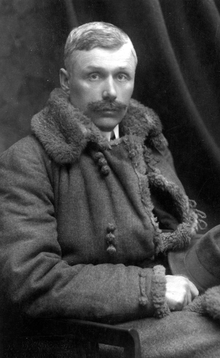Bolesław Roja
| Bolesław Roja | |
|---|---|

Bolesław Roja
with the Polish parliament Sejm |
|
| Born |
4 April 1876 Bryńce Zagórne |
| Died | 27 May 1940 (aged 64) Sachsenhausen |
| Allegiance |
|
| Service/branch |
|
| Years of service | 1899–1905 1914–1922 |
| Rank | Brigadier General |
| Battles/wars |
First World War Polish–Soviet War |
| Awards |
|
Brig. Gen. Bolesław Jerzy Roja (4 April 1876 − 27 May 1940) was an officer of the Polish Legions in World War I, a general, and a politician in the Second Polish Republic, recipient of some of the highest Polish military awards including Virtuti Militari. He opposed Józef Piłsudski and his Sanacja regime in the 1920s. After the German invasion of Poland in 1939 he was arrested and murdered by the Nazis in Sachsenhausen concentration camp.
Roja was born on April 4, 1876 in the village of Bryńce Zagórne near Żydaczów, Austrian Galicia to a family of forester Józef Roja and Maria née Trzcińska. He graduated from the Austro-Hungarian Army Cadet School in Vienna. In 1899 he was promoted to Second Lieutenant, and served with the 36th Land Defence Regiment (k.k. Landwehr Infanterie Regiment Nr. 36) in Kolomyja. In 1905, due to poor health, he was transferred to army reserve. Roja cooperated with Austro-Hungarian intelligence. For a time, he studied law and medicine at Jagiellonian University, and work as a civil servant in Kraków.
After the outbreak of World War I, Roja joined Polish Legions. He was a close coworker of Józef Piłsudski, but after Oath crisis left the Legions and rejoined Austro-Hungarian Army. In early 1918 he served in Graz, returning to Kraków after several months. Bolesław Roja immediately got involved in Polish patriotic activities. In late October 1918 he took over former Austrian Military Command in Kraków, and on November 1, the Regency Council, in recognition of his outstanding services, promoted him to the rank of Generał brygady and named him commandant of Kraków garrison. Roja’s promotion was soon confirmed by Polish Commander-in-chief, Jozef Pilsudski.
...
Wikipedia
